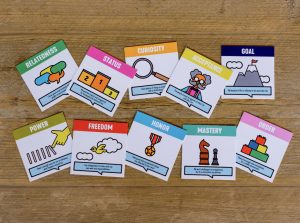Tanya Ievlanova, DMD’s Project Manager, shared her experience in tracking a motivation level.
I’ve been in DMD for 8 years, 6 of which I’m an autonomous Project manager.
Is it quite a long period for work in one place? Someone will say “yes”, and add that it is a good approach to change jobs each 5 years. Others will say “no” and share their own experience about 10, 15 year anniversary in the one company.
Working in the company my expectations, requests and of course motivation has changed and kept changing.
One of the useful tools that I use to track a motivation level is Moving Motivators. Invented by founder of Management 3.0, Jurgen Appelo, Moving Motivators is an exercise meant to help us reflect on motivation. The Moving Motivators exercise is based on ten intrinsic desires, which Jurgen derived from the works of Daniel Pink, Steven Reiss, and Edward Deci. Next, based on my own example, I would like to share with you the steps of this exercise (or you can call it a game).
First off, to decide on the purpose of the exercise. As a manager I can use the cards to check initial motivation of the new team member or track current status during 1-to-1 meetings. For myself I can check my motivation to work in the company in general or to work on a specific project.
Today I would like to check my general motivation.
Let’s review each of the cards.

It has name and brief explanation. But it is permissible to supplement the context of the motivator as you understand it for yourself. https://management30.com/practice/moving-motivators/ gives us such definitions:
Curiosity: I have plenty of things to investigate and to think about
Acceptance: The people around me approve of what I do and who I am.
Power: There’s enough room for me to influence what happens around me.
Relatedness : I have good social contacts with the people in my work.
Goal: My purpose in life is reflected in the work that I do. Honour: I feel proud that my personal values are reflected in how I work.
Mastery: My work challenges my competence but it is still within my abilities.
Freedom: I am independent of others with my work and my responsibilities.
Order: There are enough rules and policies for a stable environment.
Status: My position is good, and recognized by the people who work with me.
As the next step, let’s answer the question: How important is each of the 10 motivators for you? Place the cards in your own order in one line horizontally. On the left side (at the beginning of the line) place the most important motivators for you and further as the importance decreases.
Today (march 2020) I see the order as:
![]()
Be honest, explain why these first 3 cards are the most important to you. Pay attention to what is the least important to you right now.
Curiosity is important for me, because the PM role in different projects and with different clients can combine, touch or require at least basic knowledge in such areas as sales, delivery management, business analysis.
Goal – from one side is connected with goals of products that our teams develop. I am encouraged to participate in projects that bring social value. From another side – goal is about my own working aims and expectations.
Acceptance – I would like that PM role in projects brings value to clients and teams. Feedback, and as a special case – acceptance, is a confirmation that I’m doing everything in a right direction.
The next step – think about how each motivator is reflected in your daily activity. If the motivator is at a level enough for you, raise the card two lines up. If you would like to have improvements for some, put the card down 2 lines. If the motivator is at an acceptable level, leave the card unchanged.
I have such result:

While paying attention to important motivators, I notice that:
- Curiosity is lower than a standard level. So far, in search of a solution, how within of the working, and not personal time, allocate periods for self-study in related fields with management.
– Goal is lower than a standard level as I rethink my work’s long-term goals and why it’s important for me to achieve them.
If you have this exercise with colleagues, discuss what can improve the level of motivation, how you as PM personally, the team or the company can affect the situation. What would you (or team member) would like to keep\stop doing to have the motivator on a desired level.
An important part of any exercise is to summarize the results. What did you see? What was interesting? What surprised you?
I noticed that comparing with the previous tracking Curiosity motivator changed place with Mastery. Order’s level decreased, that is connected with process changes in the company due to its own product release, sales processes changes and PM’s place in them. Relatedness level is on a quite high level, although 50% of the new 2 new staffed teams consisted of remote employees.
Remember that it’s interesting to track your progress in dynamics. I personally do Moving motivators no more than once per 3 months.


